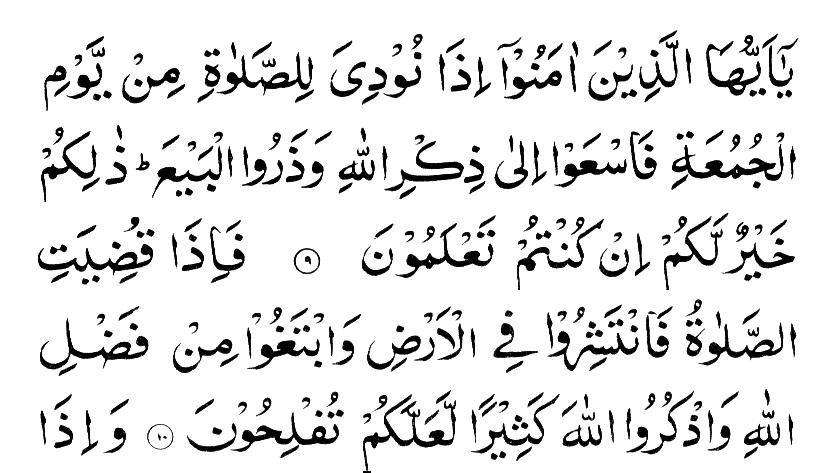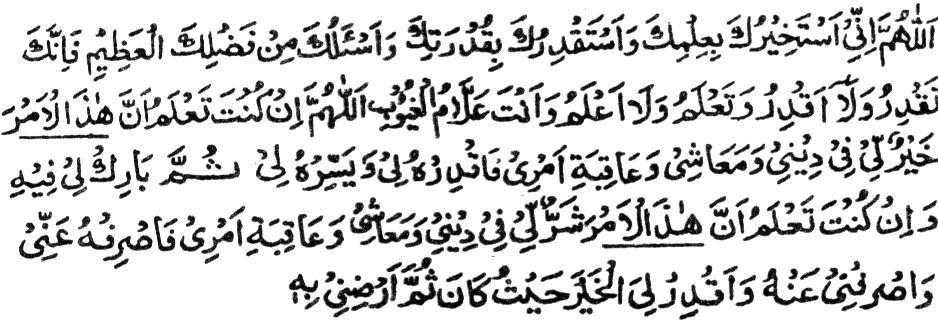Back to contents of Teachings of Islam (Talim-ul-Haq)
Contents of Part 9
- Jumuah (Friday) Salaat
- Summary of Jumuah Salaat
- Conditions for saying Jumuah Salaat
- The Masnoon method of delivering the Khutba
- Things not allowed during the Khutba
- Salaat of Eidain
- How to perform the Eid Salaat
- Namaaz of a sick person
- The Namaaz of Istikharaah
- Salaatut Taubah (repentance)

|
|
|
|
|
|
|
Jumu'ah Salaat is FARZ on all FREE, MAJOR, SANE, HEALTHY and MUQEEM MEN.
It is NOT Farz on MINOR CHILDREN, SLAVES, MAD, SICK and BLIND PERSONS, MUSAFIRS, WOMEN and those who have some VALID EXCUSE e.g. fear of an enemy or very heavy hard rain. They should perform their ZOHAR Salaat instead.
1. The Jumu'ah salaat should be in a city, BIG VILLAGE or a TOWN like
the city. It is NOT PROPER to perform the Jumu'ah salaat in a SMALL VILLAGE.
2.Jumu'ah should be performed at Zohar time.
3. KHUTBAH (address by the Imam) should be delivered BEFORE the salaat.
4. The salaat should be read with Jamaat. It is compulsory to have
at least three men besides the Imam to offer the salaat, or else the salaat
will not be valid.
5. IZNE AAM (permission to all to attend).
If all these FIVE conditions are found, performing to the Jumu'ah Salaat will be CORRECT.
Before the Jumu'ah Salaat the Imaam should sit on the MIMBAR, (the raised platform in the Masjid) and the Moazzin should call out the Azaan in the presence of the Imam. The Imam should then stand up and deliver the KHUTBA facing the congregation. It is MAKROOHE TAHREEMEE to deliver the KHUTBAH in any language besides ARABIC.
After the FIRST Khutba he should sit down for a while and then stand, up again for the SECOND Khutba. Thereafter the Imam should step down and stand in FRONT of the MEHRAAB or the ARCH. The Moazzin should call out the TAKBIR and those present should stand up and offer their Salaat with the IMAAM.
The Azaan for the Khutba should be said in FRONT of the KHATEEB (the person delivering the Khutba) near the MIMBAR or from the SECOND or THIRD ROW of the Namaazis or at the END of the ROWS or from OUTSIDE the MASJID. It is ALLOWED in ALL the ways.
1. Talking.
2. Offering SUNNAT and NAFL Salaat.
3. Eating.
4. Drinking.
5. To reply to any TALK.
6. Reciting the QURAAN SHARIF, etc.
All those things, which DISTURB the Khutba, become MAKROOH from the minute the Imam prepares to deliver the Khutba.
Things which are MUSTAHAB and SUNNAT on EID DAYS:
1. To take a BATH and do MISWAAK.
2. To put on one's BEST CLOTHES.
3. To use ITR.
4. To take DATES or any other SWEETS before going for the EIDUL FITR
Salaat.
5. To give SADAQATUL FITR BEFORE going for the EIDUL FITR Salaat.
6. To perform the Eid Salaat at the EID GAAH (a place fixed for EID
Salaat outside the population).
7. To go by FOOT.
8. To go by ONE ROUTE and return by ANOTHER.
9. NOT to perform NAFL at HOME or at the EID GAAH BEFORE and AFTER
the EID Salaat.
10. To EAT the MEAT of QURBAANI (sacrifice) of one's own offering,
after the EIDUL ADHAA Salaat.
- On EIDUL FITR one should say TAKBIR in a LOW voice while going for Salaat.
- It is MUSTAHAB to say TAKBIR ALOUD while going for EIDUL ADHAA Salaat.
- Both the Eid Salaat are WAAJIB upon all those on whom the JUMU'AH Salaat is FARZ.
- The conditions for Eid Salaat are the same as those for Jumu'ah.
- However, KHUTBA is NOT Farz for EID nor is it Farz to be said BEFORE the Salaat.
- KHUTBA after Salaat is SUNNAT.
- There are TWO Rak'aats in each of the TWO Eid Salaat with SIX extra TAKBIRS.
- There is NO Azaan or Iqaamat.
First of all the NIYYAT should be made follows:
"I am performing TWO Rak'aat Eidul Fitr (or Eidul Adha) Wajib
with six extra Takbirs behind this imam, (Allahu Akbar)."
Fold the HANDS after the Takbeer and read THANA.
1. Then raising both hands upto the EARS bring them down, saying Allahu
Akbar.
2. Do the same for the second time.
3. For the third time raise the hands upto the ears and saying Takbir
fold them below the navel.
The Imam should read the Ta'awwuz Tasmiah and Surah Faatiha along with another Surah and then go into RUKU:
1. When all stand up for the SECOND Rak'at, the Imam should recite the
QIRAAT and after that all should say TAKBIR and raise the hands upto the
ears and let them down.
2. Again the hands should be raised upto the ears for the second Takbir
and let down.
3. For the THIRD Takbir the hands should also be raised upto the ears
and let down.
4. Then saying the FOURTH Takbir everyone should go into Ruku and complete
the Salaat as usual.
5. Then the Imam should stand up and deliver the Khutba and all should
sit SILENTLY and HEAR the same.
6. There are TWO Khutbas also for Eidain. The Imam's sitting for a
while between the two is MASNOON.
7. It is WAAJIB to LISTEN to the Khutba of Eidain.
A person is ALLOWED to perform SALAAT in the SITTING POSITION under these circumstances:
- When a SICK person has NO STRENGTH to STAND and perform his Salaat.
- STANDING causes him GREAT PAIN.
- It may INCREASE his ILLNESS.
- When a SICK person is ABLE to STAND but CANNOT go into RUKU or SAJDA.
- If a person does NOT have the strength to make RUKU or SAJDA, then the Ruku and Sajda must be made by ISHARA (gestures) i.e. BOWING the HEAD SLIGHTLY for RUKU and MORE for SAJDA.
- If a person CANNOT perform his Salaat SITTING, then he should perform it LYING DOWN.
- E.g. LIE down on the BACK with the LEG towards the QIBLA.
- The LEGS should NOT be STRETCHED but the KNEES should be RAISED.
- The HEAD should REST at a HIGH LEVEL with a PILLOW under it.
- The Salaat must be made by ISHARA (gesture), but for SAJDA he should BOW his HEAD MORE than for RUKU.
- This is the BEST and MOST PREFERRED POSTURE.
- If the KNEES CANNOT be RAISED then one CAN STRETCH one's LEGS towards the QIBLA but the HEAD should be RAISED and FACING the QIBLAH
- One may also LIE down on the RIGHT SIDE with the HEAD towards the QIBLA or on the LEFT SIDE with the HEAD towards the QIBLA. However, it is PREFERABLE to LIE on the RIGHT SIDE.
- If a person FAINTS for LESS than a FULL DAY and NIGHT, he MUST perform the missed number of Salaat.
- However, if he FAINTS for a FULL day and night or more, he must not perform the Salaat he has missed. He is EXEMPTED from performing them and there is NO QAZAA.
- If the patient has NO STRENGTH even to MOVE the HEAD for ISHARA (gesture), then one should NOT perform the Salaat.
- If this condition continues for MORE than a DAY and NIGHT, one will NOT be BOUND to perform QAZA for the missed number of Salaat.
- If one GAINS the strength of moving the HEAD for ISHARA (gesture) within a day or night or in a period lesser than that, the QAZA will have to be performed for the five or lesser Salaat.
- N.B. TAYAMMUM is PERMITTED when it is KNOWN by one's OWN EXPERIENCE or a GOOD DOCTOR says that the USE of WATER would DEFINITELY be INJURIOUS to one's HEALTH.
- If a sick person's bedding is NAJIS (impure) and changing it would cause great inconvenience to the patient, then Namaaz may be performed on the same bedding.
- A PARALYSED person or one who is so sick that he cannot use water for ISTINJA should use toilet paper or something absorbent or dry clay to clean himself.
- If he cannot do this also, he should perform his Salaat without even making Istinja.
- One who has undergone eye surgery and is not allowed to shake his head by the doctor, should perform his Salaat lying down.
- TAYAMMUM should be made if he cannot make WUDHU. If he cannot perform Tayammum himself, he may be assisted.
When a person wishes to carry out some important work, guidance should
be sought from Allah Ta'ala. This seeking of guidance is called ISTIKHAARAH.
Nabi ![]() has mentioned that a person who does not seek guidance from Allah Ta'aala
and does not carry out Istikhaarah is deprived of all good and is unfortunate.
Insha-Allah there will be no regret if Istikhaarah is made before accepting
a proposal for marriage, travel, important business or any other important
task. Perform two Rak'aats Nafil Salaat. Thereafter praise Allah by saying
has mentioned that a person who does not seek guidance from Allah Ta'aala
and does not carry out Istikhaarah is deprived of all good and is unfortunate.
Insha-Allah there will be no regret if Istikhaarah is made before accepting
a proposal for marriage, travel, important business or any other important
task. Perform two Rak'aats Nafil Salaat. Thereafter praise Allah by saying 
Thereafter recite Durood upon Nabi ![]()

and recite the du’aa of Istikharaah:

Upon reaching the underlined words think of the reason and work for
which Istikhaarah is being made. Thereafter, sleep on a clean bedding with
Wudhu facing the Qiblah.
Upon awaking carry out that task on which the heart is firm. If one
cannot reach a solution on the first day, Istikhaarah should be continued
until the seventh day. Insha-Allah by this period the doubt will be over.
One should not make istikhaarah for performing a Farz duty, e.g. should
I perform Hajj or not. Istikhaarah should rather be made to determine the
time of travel for Hajj, e.g. When should I travel for Hajj?
If a person has committed any sin, perform two Rak'aats Salaat and thereafter
recite Durood upon Nabi ![]() .
Be ashamed and regret over the sin and seek Allah's pardon by a firm pledge
saying: Oh Allah! I shall not commit this sin again. Oh Allah! forgive
me.
.
Be ashamed and regret over the sin and seek Allah's pardon by a firm pledge
saying: Oh Allah! I shall not commit this sin again. Oh Allah! forgive
me.
By the grace of Allah Ta'aala the sin will be forgiven.
